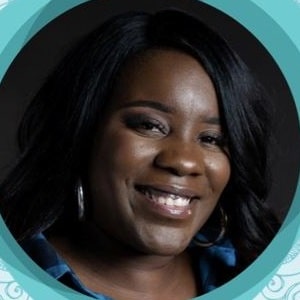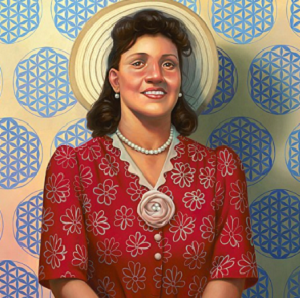Diagnosed with cervical cancer
Henrietta Lacks, an African American mother of five children, was diagnosed with cervical cancer at The Johns Hopkins Hospital in Baltimore in 1951.
Despite undergoing radium treatments, the standard medical care at the time, Lacks died of the cancer later that year at age 31.
Samples of her cancer cells, now called HeLa cells, have the extraordinary ability to continue reproducing and have been used in more than 75,000 scientific studies ever since.
Source: “The Legacy of Henrietta Lacks” (Johns Hopkins Medicine)
See also: “The stolen cells of Henrietta Lacks and their ongoing contribution to science” by Katharine Lang on the Medical News Today website (2022)
And: “Henrietta Lacks’ family appointed World Health Organization Goodwill Ambassadors for Cervical Cancer Elimination” on the World Health Organization website (2022)
Tamara
“I first realized something was going wrong with me or that I could have cancer,” recalls Tamara. “My original doctor was like, are you serious?”
“I ended up going to another professional who listened to me and actually saw and was like, let’s see. There’s lots of bleeding. You say that there’s pain, this is a problem. I was diagnosed with stage two cervical cancer and headed towards stage three cancer.”
She underwent “my chemo, my radiation surgeries and everything.”
“You don’t have to go through all the things I went through and that’s just listening to your body and getting your regular cervical cancer screenings. You don’t have to share your cancer story.
What you could share is when you went and had your cervical cancer screening. You could talk about that. I want women to not have a cancer story and you can do that when you prevent it.”
A 3-minute video from the American Cancer Society
Tamika
“My journey started in 2001. I hadn’t had a Pap test for a few years for various reasons, from not having insurance to body issues,” says Tamika Felker. At a physician exam, she expected to be told to lose weight, but instead she was diagnosed with advanced cervical cancer.
When she found out it was linked to HPV, “I was ashamed, I felt that people would look at me a different way. But once I started researching it, I found out how common it was and speaking to other women who had it and knowing that they felt the same way. We shouldn’t feel this way.”
“I feel like when we don’t talk about cervical cancer, we’re not helping someone else prevent it. HPV is a virus that could happen to anyone.”
“This is what I’ve learned after surviving for 10 years: fighting cervical cancer is really, unbelievably hard and I did it. But the thing is, preventing it is very easy.”
A 6-minute video from Roche Molecular Diagnostics
Patti Murillo-Casa
“I had just retired and my husband and I thought that we were going to travel the world,” says Patti Murillo-Casa. “We were so busy and then I got diagnosed with cervical cancer. it was shocking. I did not expect this. It was not in our plans at all.”
“I had a fight for my life. Just one 5-minute visit for a Pap test would have avoided me going through so much heartache for me and my family.”
“Latinas tend to shy away from this topic but they have to know that having the human papilloma virus is nothing to be ashamed of. They have to visit the doctor annually and take care of themselves. They have to make sure that they put themselves first.”
“I want women to know that they should not for any reason fail to go to their gynecologist and have the Pap test.”
A 6-minute video from Cervivor TV.
A 2022 update on Patti 13 years after testing free of cancer.
Kimberly Williams
When Kimberly Williams was a 42-year-old mother of two several years ago, she received a life-changing diagnosis of cervical cancer.
“’Oh my God, how long has this been living inside of my body? Am I going to die? Who’s going to raise my children?'” she thought.
At the time, Williams had never known anyone else who had experienced cervical cancer, and despite having had an abnormal pap smear in her 20’s, she spent the next two decades unaware that she was potentially carrying a strain of the human papillomavirus (HPV) responsible for more than 95% of cervical cancer cases.
“No one ever told me my HPV status. No one ever said, ‘Hey, this is something that you need to be checking….’ My story may have been different,” she says.
Williams survived her diagnosis, though it resulted in her undergoing chemotherapy, radiation treatment, as well as a radical hysterectomy removing her uterus, cervix, the connective tissue around the cervix, and part of the vagina.

Williams now works with Cervivor, a group that describes itself as a “global community of patient advocates who inspire and empower those affected by cervical cancer.”
See “Cervical cancer kills Black women at a disproportionately higher rate than whites” by Alana Wise on the NPR website (January 31, 2022)
Jany
“This is very personal…This is very hard for me to talk about…This really, really sucked…I feel like my story can help somebody out there…You don’t want to be in my shoes…
I urge women out there to go get Pap smears and my story is going to remnd you why you need to do that…Ladies, don’t delay this. Don’t put it off.”
Jani Marti, 26, was reassured for two years that the abnormal cells from her regular Pap tests were nothing to worry about until she was suddenly diagnosed with an aggressive form of cervical cancer. She survived, but she’s mad because she feels her doctor neglected her for a long time and put her through a lot of unnecessary physical and emotional pain.
“The reason I felt it was so important to tell my story is because I’ve sat with other women and other girls my age and talked to them about my problem and they told me, oh, yeah, I’ve had abnormal Paps for three years.
Not okay. It’s not, not okay to have abnormal Paps for three years. It’s not okay if your doctor tells you it’s okay. Bullshit. Go find another doctor, Not okay.
A 34-minute video from 26-year old Jani Marti about her ordeal of being diagnosed with cervical cancer.
What I wish my doctor had known about me and my cervical cancer
Eleven cervical cancer survivors speak out about their regrets over what their doctors should have known about them personally and medically.
A powerful, emotional 3-minute video from the American Sexual Health Association.

